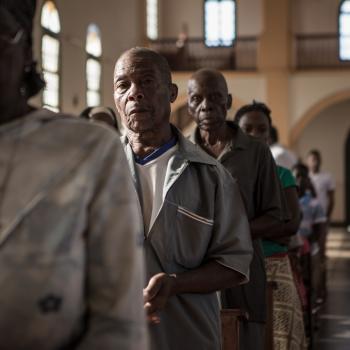 My sister my brother and I are right now, from three separate states, trying to put together a reception for our parents’ fiftieth wedding anniversary. In addition to the normal stress these things bring, we are feeling a dark ambivalence about the whole affair. It’s not the celebration itself that gives us pause. It’s where we are compelled to hold it.
My sister my brother and I are right now, from three separate states, trying to put together a reception for our parents’ fiftieth wedding anniversary. In addition to the normal stress these things bring, we are feeling a dark ambivalence about the whole affair. It’s not the celebration itself that gives us pause. It’s where we are compelled to hold it.
We will be going back to the church of our childhood.
I think of the movie Junebug, in which our hapless protagonist, simply home for a visit, is called out to sing a hymn for everyone. The fact that we are the preacher’s kids, and expected to be involved every time we return is only part of the problem. That would be easy enough to deal with if there weren’t so many conflicted emotions going on under the surface.
We will go of course. And we will stand and sing. Church members will smile at us, tell us it’s good to see us, and wonder why the last time they saw us was seven years ago, at dad’s retirement from the pastorate there.
There are two related reasons. We were part of this family of hundreds of people who met three times a week, none of whom we knew intimately.
Dad took this church when I was one, my sister was three, and our little brother was just an infant. He stayed at that same ministry until his retirement, thirty-eight years later—something anyone familiar with fundamentalist Baptists knows is quite a feat.
This church was the center of our world growing up. We were immersed in it, participated always, never missed a service or a special meeting or a spring revival or a fall revival or an AWANA club for any reason. We did not have a family as much as we had a church.
We had the constant pressure to sing or preach or teach Sunday school, or—when we inevitably rebelled—to do business with Jesus, get right with Christ, rededicate our lives to the Lord. All with everyone watching. It didn’t feel like we had parents either; we had the preacher and his wife—except at our house you had to be on your best behavior because the preacher could pop in at any minute.
We lived next door to the church and men popped into our kitchen day and night without knocking because the church bus and van keys hung by the door for their convenience. In our small town church members were everywhere. If I took a turn too fast at Smith’s Super Value, by the time I got to the house, someone had called and told dad I was out driving recklessly.
And as I write, I feel like a whiner. What preacher’s kid cannot make similar complaints?
But there’s more to it. The religion of our childhood was a particularly nasty strain of fundamentalism. The primary motivator was shame. The attendant emotions were fear and guilt: Fear in wondering what horrific punishment was coming. Guilt in knowing that whatever painful thing it was, we had earned every bit of it. My earliest thoughts of God were imagining him as a giant angry ogre, following me around, waiting for the slightest excuse to put his boot to my ass.
It didn’t matter if what pursued was sinful or not. If I loved it and lost myself in it, it was taking the place of God in my life, which made it de facto sin.
When I read in Wise Blood years later about Hazel Motes seeing Jesus sneaking around, peeking from behind trees, watching him, I thought, if only—I could live with that.
It wasn’t a furtive Jesus watching us—it was a bitter, vengeful god waiting to thrash us at the slightest provocation, no matter how innocent the childish misstep. Joy was beaten out of everything we loved if it didn’t have as its specific purpose winning lost souls to Christ. There was no other worthy pursuit.
Sports? No. Cooking? No. Music? Writing? Forget it. If you weren’t using it as a tool for evangelism, it was an idol, born of your evil desire to please your sinful self and not God. It was tainted, and must be laid with your all on the altar of sacrifice.
So there was the ever-present sense of not being quite holy enough, quite sold-out to the Lord enough, of giving and giving and giving, and still always getting it wrong, being displeasing to an angry God.
I didn’t want to do it. I didn’t even want to be there. Even though I no longer believed God was an angry ogre following me around, waiting to punish me, I’d never been able to shake this nagging sense that some undefined but angry presence hovered over me, a feeling that any minute I was going to get a cosmic boot in my ass. There was also still the feeling that whatever I did bring, it would not be good enough.
Those were my thoughts before going.
Now I sit having just returned home from the celebration. I have to say the experience was not as unpleasant as I had feared. It was actually kind of nice. This is entirely because of the people from my childhood who are still at the church. They greeted my sister, my brother, and me warmly, were generous and kind, and seemed genuinely glad to see us.
This is another part of my ambivalence about my childhood in that church: though I remember the religion as soul-crushing, the people, almost all of them, were kind-hearted and loving.
I’m not sure how the two things can coexist in the same congregation, but it seems they do. And though I am fond of a great number of people there, I still have no intention of going back any time soon.











